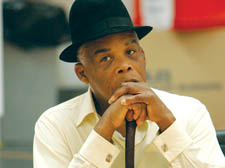|
|
 |
| |

Oscar James" 'a reflection of what's going on now' |
A West Indian take on slavery
Simon Wroe hears politics (and lively banter) when he talks to two of the UK’s top black actors about their new play
EARLIER this year, the erstwhile PM Tony Blair delivered a speech expressing his “deep sorrow and regret” for Britain’s role in the slave trade.
His declaration and conspicuous lack of an apology (on the advice of the Government’s legal advisers) was the inspiration for Kwame Kwei-Armah’s new play, Statement of Regret, opening at the National’s Cottesloe Theatre this week.
Don Warrington, well-known for his extensive stage and television work including Philip in Rising Damp, plays Kwaku Mackenzie, the founder of a black policy think tank who turns to drink after his father’s death.
Fractures form in his team, media interest pales and, worst of all, he favours a young Oxford scholar over his own son.
“It’s about keeping that think tank functioning and relevant in the world we live in,” explains Chalk Farm resident Don. “It’s to keep black people and what will benefit black people at the forefront of politics and societal influence.”
But when, in an attempt to garner public attention, Mackenzie suggests that only the West Indian community deserves reparations for the slave trade, the need for solidarity in the black community becomes swiftly and painfully clear.
The play poses big questions about the true costs of reparation and the continuing psychological burden of enslavement, but Don is keen to emphasise what Kwame calls the “theatre of his front room”.
“On one level one could say it is political but it is essentially about family, “says Don. “You could have a political family or an ordinary family, but it’s about the relationships between family. In this case, the family is covered by the umbrella of this think tank and what its ethos is, what it’s set itself up to do and what it does now. In the truest sense, politics is executed between one person and another. It’s not something that’s linked directly into the spine of the play. It’s growing into the trunk of the play.”
“I think it’s a reflection of what’s going on now,” says fellow actor Oscar James, who plays West Indian stalwart Soby. “Being old I see it happening all around me. As far as I am concerned, from a black person’s point of view, we are being left out. People credit the Africans, Indians, Chinese with helping build this country but the West Indians are always forgotten.
“It’s nothing new, it’s been happening since I’ve been in this country. But it’s interesting to look at a younger black British person, like Kwame. They’re in a position to do what we couldn’t do before and I think it is beautiful that they’re coming out with it now and saying the things we never had the opportunity to say.
“Maybe I’m still old fashioned but I can’t see a lot of Black plays being put on. This is giving young black actors more of chance to perform – to do things and play better parts.”
This is not the first time the actors have worked together. In fact, they were united, albeit in very different roles, for Elmina’s Kitchen – Kwame’s first play in his trilogy exploring black family life, followed by Fix Up in 2005. Their relationship is quite familial itself, with Oscar fondly torturing Don with praise.
“I’ve known Oscar for years and I’ve admired him greatly,” begins Don.
“No, no – I admire him,” corrects Oscar. “I admired him because he was younger and more beautiful and I love his work.” Don rolls his eyes.
“I’ve seen quite a lot of young black actors but he was really one of the ones that impressed me – stop kicking me.”
Don interjects: “Anyway, anyway... We had a very good relationship in Elmina’s Kitchen and in this play we have a very different one on stage. Kwame’s always had it in his head that he wanted to do a trilogy of plays. Elmina’s was the first one, which talked a lot about street life for black people. As far as I understand it, this is a continuation of the process he started with Elmina.”
Recent ill-health has prevented Kilburn resident Oscar from doing as many plays as he would like, but he makes an exception for Kwame.
“Kwame’s saying things that should have been said a long time ago, as far as I’m concerned,” he says. “And the parts he has given me are just right for me. No one else has given me those type of parts to play, which are authentic to read and real. I feel I can get along with his words. He writes as he feels and then you adapt to it.”
His tone turns more serious. “He writes from a West Indian point of view. He goes back to roots all the time, so at least the kids who were born here will learn something else from the Caribbean.
“The African kids, they go back to Africa occasionally, the Chinese kids go back to China but West Indian kids very rarely go back. If they can write things to bring them there that’s fine. There’s not a lot of West Indians coming over here any more and the older ones are dying out.”
Then talk turns to Don’s recent TV work and Oscar’s mischievous glint returns.
“He did Dr Who,” Oscar interrupts.
“Oh please, let’s not get into that,” begs Don.
“No, but the public wants to know.”
“Well either they’ll know or they won’t”
“I’m sorry, I’m going to tell him.”
“But why do you want to? He’s got enough.”
“No, it’s not enough. You’ve got to sell yourself a little more and you don’t like to sell yourself so much so I have to tell him.”
• |

|
 |
|
 |
|

